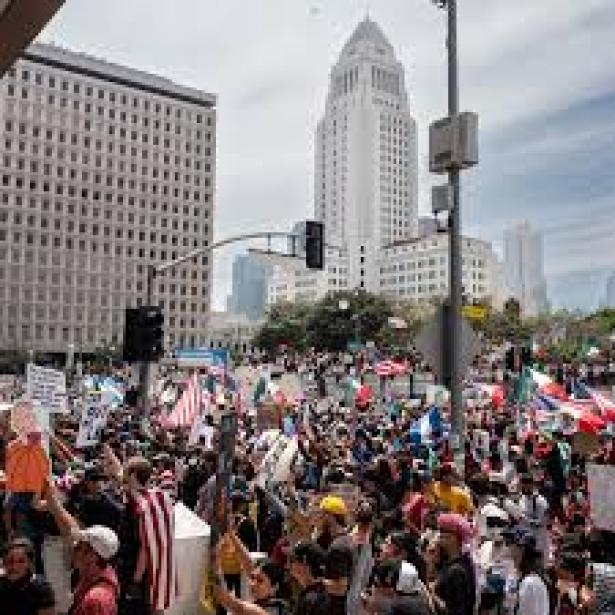For tens of thousands of Angelenos, this month’s “No Kings” protests were a way to peacefully register discontent with the Trump administration. For some in their midst, the protests represented something else entirely: a bonanza of potential signers.
The June 14 demonstrations turned into an unexpected battleground for those organizing on both sides of a roiling, pre-Olympic conflict between Los Angeles’ formidable travel industry and powerful unions.
After the city council passed a $30 minimum wage law in late May for workers in the airline, hotel and hospitality industries, a group of business interests — signed by players in the local hospitality industry and funded by major airlines and industry groups like Delta, United and the American Hotel & Lodging Association — launched a referendum effort to challenge the new law.
“We’re giving everything we have to make this business work, to claw out of the hole that was created by COVID,” said Greg Plummer, a referendum proponent who runs a 250-employee concession company at LAX. “Our airports are still down substantially in traffic. Tourism is completely down, and the fires didn't help … it gets to a point where it's going to crumble a lot of small businesses.”
Unions countered with two initiatives of their own last week, one that would increase the citywide minimum wage to $30 per hour for workers across sectors and another that would require voter approval for the construction of large hotels, significant hotel expansions and “event centers” like sports stadiums.
“Hotels and the airlines are spending millions of dollars to make sure their workers don't get a raise,” said Kurt Petersen, head of Unite Here Local 11, which filed the initiatives. “We think that the city of Los Angeles should be very careful about providing subsidies and benefits to those particular industries.”
The timing of the long-planned “No Kings” protest proved fortuitous for those facing urgent ballot deadlines. As crowds gathered at a series of protests across the city, from downtown’s City Hall to Playa Vista in the west, signature-gatherers fanned out amid sign-touting protesters to pull together the 92,998 signatures the LA Alliance for Tourism, Jobs and Progress will need by the end of month to qualify a referendum.
Initiative and amendment committees seeking a spot on California’s 2026 statewide ballot will soon begin sending petition carriers out to farmers’ markets and strip malls, where they will have to convince unwilling shoppers to think politics when their minds are on produce. But in Los Angeles, campaigners are taking advantage of an often-apathetic city roused by President Donald Trump’s aggressive immigration-enforcement tactics to help move the minimum-wage conflict from the city council to the ballot.
“You have a lot of civically minded, peaceful protesters at No Kings — these are the kinds of folks who are looking to be engaged politically, so it makes perfect sense … to show up there,” said Robb Korinke, a San Diego-based strategist who specializes in local ballot measures.
The tactics that the industry-funded coalition has used to capture signatures have come under fire from backers of the $30 minimum wage law. Labor-friendly members of the LA City Council filed a motion to investigate what they said were misleading tactics on the part of the referendum effort’s signature-gatherers, while unions have filed a similar complaint with Attorney General Rob Bonta, Los Angeles County DA Nathan Hochman and City Attorney Hydee Feldstein Soto. The referendum campaign denies the allegations.
“What it shows to me is that they have people out there essentially saying and doing anything to get their signatures on this referendum,” said LA City Councilmember Hugo Soto-Martinez.
Now it’s labor’s turn to take to the streets. Unions have 120 days to gather around 140,000 valid signatures — and labor leaders are confident that they won’t struggle to find the support they need.
“We poll on raising the minimum wage — the only thing that polls higher is the belief in God,” said Petersen. “That has been our experience all along, in every one of these initiatives that we've either tried through the ballot and or through the law … and so I think we will be fine at the ballot.”


Spread the word